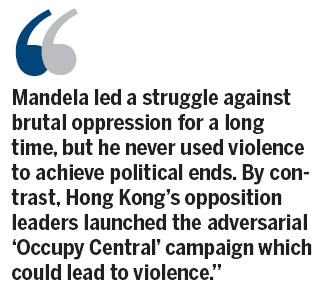HK opposition should not insult Mandela's memory
Updated: 2013-12-10 06:43
By Zhou Bajun(HK Edition)
|
|||||||||
Last May, while standing at Table Mountain and overlooking Robben Island where Nelson Mandela had been jailed by the South African apartheid regime for 18 years, I remembered an important incident from his presidential inauguration.
Mandela invited a white jailer who had helped imprison him for 27 years to his inauguration as South Africa's first black president. This also reminded me that Mandela negotiated with then white president F.W. de Klerk and peacefully helped to abolish apartheid and establish multiracial elections in 1994. As South Africa's first black president, Mandela formed the "Government of National Unity" in an attempt to defuse racial tension.
Mandela's whole life shone with a noble spirit. His many qualities included not only courage and determination, but inclusiveness, magnanimity and warmth. These were all necessary to bring about the political transition needed to build a new country.
Here in Hong Kong, leaders of opposition camp often boast that their anti-central government campaign is like Mandela's movement in South Africa. Hearing that Mandela had died, a leader of the "Occupy Central" argued that the campaign echoed Mandela's spirit in appealing to the conscience of the rulers in the Hong Kong Special Administrative Region (HKSAR). In reality, there are significant differences between the actions of Mandela and those of Hong Kong's opposition.
Firstly, and most importantly, what Mandela did last century was to end white colonialism. What the Hong Kong opposition is doing is trying to revive colonial attitudes.
I have reiterated in this column that the political blueprint being promoted by the opposition was designed by Britain 29 years ago. London suddenly announced that some sort of Western political model would be introduced to the territory two months before signing of the Sino-British Joint Declaration in 1984. Britain was only interested in supporting the political aspirations of Hong Kong people who believed in Western values.
London also wanted to continue its influence in Hong Kong after the territory returned to China.

But Beijing knew what Britain wanted. While promising the city universal suffrage as part of its move toward democratization, the central government authorities insists that any progress toward universal suffrage should adhere to the Basic Law and decisions by the National People's Congress Standing Committee (NPCSC). Hong Kong cannot transform itself into an independent entity subject to Western nations. The city should reconcile its democratization by returning comprehensively to the motherland. Only if the majority of Hongkongers acknowledge themselves as Chinese, can universal suffrage be established on a sound political foundation. Nevertheless, the opposition constantly tries to make Hong Kong's constitutional development deviate from the Basic Law and NPCSC's decisions.
Mandela was a magnificent inspiration to people. His integrity touched billions. He helped create a peaceful transition from a white apartheid regime to a truly democratic republic. Today in Hong Kong, the opposition is relying on more support in some elements of the society than the "Love the Nation, Love Hong Kong" camp. It wants to compel the central government to give away its constitutional obligations to allow the city to move from being a special administrative region to an independent entity.
Mandela led a struggle against brutal oppression for a long time, but he never used violence to achieve political ends. By contrast, Hong Kong's opposition leaders launched the adversarial "Occupy Central" campaign which could lead to violence. Benny Tai Yiu-ting, one of the campaign's advocates, not only likened the "Occupy Central" movement to "a nuclear bomb" threatening the central government, but he also acknowledged the campaign could be harmful to everybody in the territory.
The Hong Kong opposition likes to compare itself to Mandela. But there is no similarity between Mandela and Hong Kong's opposition leaders. Take away the mask and the real face of the opposition is ugly and unpleasant. Don't insult Mandela! He was a great man. Most of the opposition leaders are mean-spirited people.
We grieve for Mandela not only because he was a friend of China, but also because he was like a beacon of light for humanity.
While preparing for a long struggle against the opposition, the "Love the Nation, Love Hong Kong" camp believes in "seeking big common points while reserving big differences". This will enable us to reach a consensus in the community and progress to achieving universal suffrage.
The author is a veteran of current affairs commentary.
(HK Edition 12/10/2013 page9)